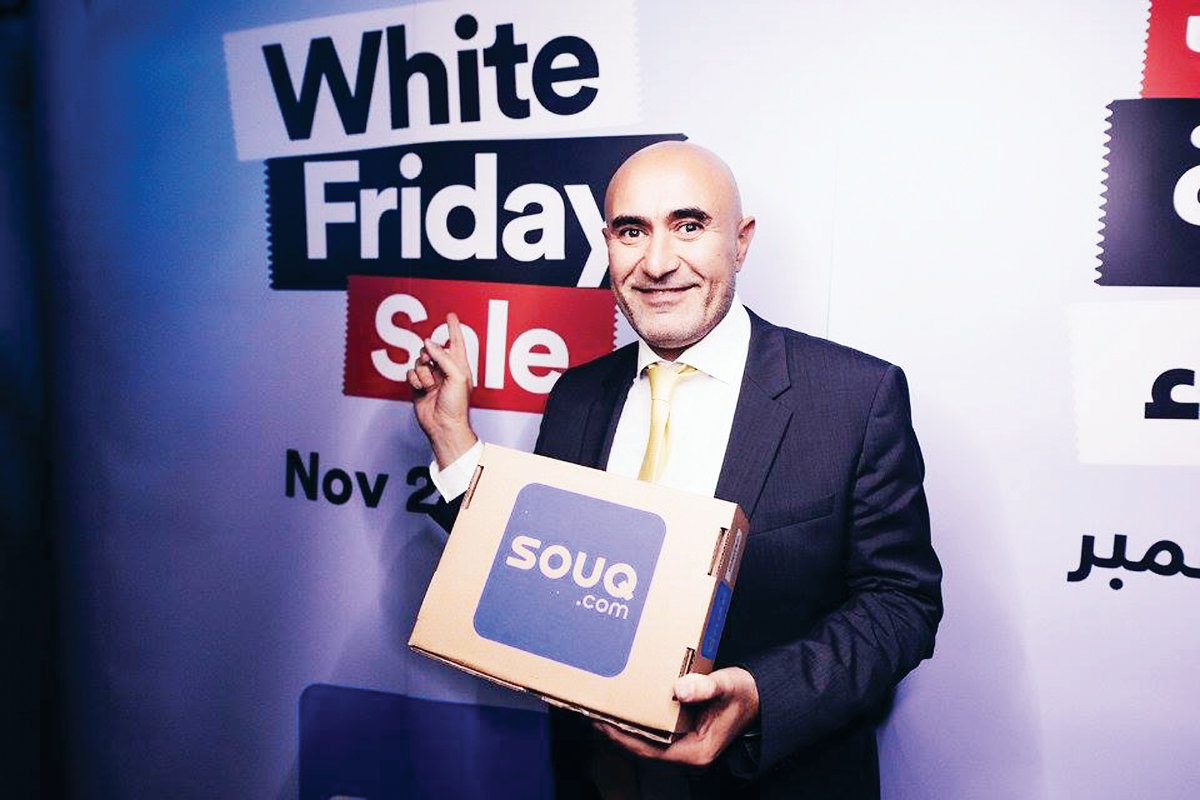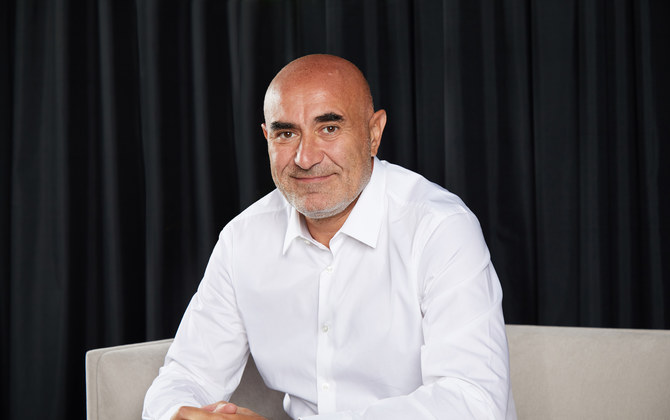RIYADH: MENA’s first man of the internet Ronaldo Mouchawar may have sold the firm he set up for $580 million, but has the same drive he had when he joined his first startup 20 years ago.
The Syrian entrepreneur built the largest online marketplace in the region, Souq.com, in 2005 and 12 years later sold it to US tech giant Amazon.
But rather than sunning himself on the most exclusive beaches around the world, he stayed on to become vice president of Amazon MENA.
Souq now attracts more than 45 million customers per month and offers 9.5 million products on its platform, ranging from consumer electronics, household goods, fashion brands to baby products. It employs 4,500 staff.
Mouchawar’s career is closely linked with the development of the web in the region.
Born in Aleppo, Syria, to a family of traders and engineers, Mouchawar was a basketball star at local team Jalaa SC Aleppo, before heading to the US’ Northeastern University in Boston in the late 1980s to study a bachelor’s and later master’s degree in computer science.

Ronaldo Mouchawar
He remained in the US, working at information technology firm EDS, founded by billionaire Ross Perot, who unsuccessfully ran for the US presidency in 1992. Mouchawar was kept busy at the business dealing in the emerging field of image processing and video scanning for car manufacturers, healthcare organizations and publishing companies.
As the web grew rapidly in the US in the early 2000s, Mouchawar returned to the Middle East, where digital firms were an emerging venture.
He joined Jordan-based Maktoob.com, whose founders Samih Toukan and Hussam Khoury pioneered online services in the Middle East. At that time, little on the internet was in Arabic.
“Samih and Hussam built the first Arabic version of email,” Mouchawar told Arab News. “And many Arabic speakers across the world started using this tool because it enabled you to write in Arabic regardless of where you were and what operating system you were using. Maktoob also provided an Arabic language chat room and instant messaging.
“We immediately saw traction with young people. It was all about self-expression, because we did not produce our own content — it was entirely user-generated.
“We would get energizing emails from customers who were using our platform to communicate, post blogs and create forums.”
But while Maktoob was growing in popularity, its revenue was low. “We wanted to monetize our portals as the traffic grew,” Mouchawar said.
“And we thought that building an e-commerce section would make a lot of sense.”
Mouchawar led the effort to create Maktoob’s online shopping platform, offering an auction system modeled on eBay.
This prototype online market faced commercial challenges at the outset because, as Mouchawar, 52, said: “Our business model was driven by online advertising, and at that time almost all of a firm’s media spend was on traditional outlets — TV, outdoor, print, newspapers, flyers and so on. Digital was still a very small segment.
“But the fun part was that every month, we felt we were better than the month before. Even though not everything made a lot of sense to us. We were always wondering: ‘How can we get people to trade safely? How can we get people to trust us? How can we get merchants to sell and can we get customers to buy?’
“It was a bit of chaos theory at work, in terms of learning, trying many new things and building trust.”
But their work paid off and Maktoob was established as a key e-commerce site in the Gulf.
Mouchawar’s influence within the firm grew but he remained an employee, although he had ambitions to be his own boss.
With investment from Toukan, Mouchawar co-founded the Souq.com marketplace (souq means market in Arabic), which was founded in Dubai in 2005. Toukan became the other co-founder of the business.
“We were incubated in a way within the Maktoob ecosystem,” Mouchawar said.
He added: “With Maktoob, we were trying to cover the entire region. The mission of Souq was to use technology to break barriers and borders, and enable trade, but focused on only three countries — the UAE, Saudi Arabia and Egypt.”
Souq concentrated on business-to-customer and peer-to-peer selling, where ordinary users sell among themselves.
There was an influx of funds in 2009 when Maktoob was bought by Yahoo for $164 million. Toukan was a key shareholder but Mouchawar also benefited from stock options he held.
Mouchawar said: “At that point, we took a hard look at the customer journey. We decided to become an entirely business-to-customer site, and shut down some of the early community tools.
“And that was the pivot point, where we moved from a kind of community environment to more what looked like an Amazon offering.”
Souq achieved growth in three ways. Its sales numbers lifted, it bought rivals, and launched other related logistics and online payment startups. The entrepreneur said that the moves proved to be a virtuous circle, as these areas supported one another.
Mouchawar also brought in global talent, hiring senior staff from US multinationals such as Proctor & Gamble, Gillette and major international banks.
This led to Souq’s first venture capital investment round in 2012, with $40 million in equity funding led by US investment firm Tiger Global Management and South African fund Naspers.
“That investment took us to another level in terms of being able to focus on service and delivery,” said Mouchawar. “Over the next four years, we went from $60 million to $400 million turnover. It was insane growth. And we were bringing in new people — college graduates who within two or three years were managing teams of 40 people. That was life-changing for them.
“And we were serving our customers better, shortening delivery times and improving our payment proposition. We held our first White Friday (a regional version of US-inspired Black Friday sales held in late November) in 2014 for the first time, with big brands involved.”
Advisers tempted Mouchwar to expand into many different countries, but he was intent on growing the business within its existing territories.
“I say this to many entrepreneurs — sometimes by doing less, you do more. There are many bright people with good ideas, but you need to stand for something —and we wanted to stand for business-to-consumer e-commerce in this specific part of the world. We wanted to facilitate trade, gain trust and help entrepreneurs build businesses online.”
Another key funding round came in 2016, when Souq raised $270 million of investment led by Standard Chartered Bank and venture capital group International Finance Corporation.
“This was a large round. That’s when we surfaced on the global map,” said Mouchawar.
The company raised a total of $425 million across several rounds of funding by 2017, according to tech data website CrunchBase.
By now, Mouchawar added that Souq’s early investors were hungry for returns, and with interest from the world’s biggest tech firms, the chance of an acquisition grew.
Dubai real estate company Emaar had sought to buy the online business.
But a team from Amazon, lead by CEO Jeff Bezos, flew in to meet Souq’s top executives and toured the region, leaving impressed by what they saw.
A takeover of Souq by Amazon made sense for both sides, said Mouchawar. For Souq, the US giant would deliver a new level of infrastructure. For Amazon, Souq represented access to one of the world’s fastest-growing online marketplaces.
“I thought that with Amazon, we could build a large business with exciting innovations in a region with high mobile adoption, a young user base and a huge opportunity for commerce, cloud content and devices. Also, with more than 420 million Arabic-speaking people in the world, there are still many services that we could develop for them.”
The deal was signed in March 2017 when Amazon paid Souq for $580 million for the business.
However, Mouchawar felt compelled to stay on and accepted the position of vice president at Amazon MENA.
“Like some other colleagues at Souq, I didn’t feel the mission was done,” he said. “There was still a lot to do. I was excited to learn a lot more about Amazon and how things operate at that scale. We could employ more people, empower more people and build more talent.”
Sales at Amazon lifted 38 percent to $386 billion as net income jumped 84 percent to $21.3 billion last year, as consumers in lockdowns around the world ordered from the platform. The tech giant’s international sales, which includes Souq, surged by 40 percent over the same period.
Mouchawar said: “Since then, we’ve launched Amazon in Arabic in the UAE, Saudi Arabia and Egypt. And the December release of our virtual assistant Alexa in numerous regional dialects of Arabic was another key moment.”
Mouchawar seems comfortable working as the tech giant’s main man in the region.
He said: “For me, it’s always about working with smart, bright people, both locally and globally. As long as I’m learning how to bring new things to the region, I still feel excited about the role I play.”
















